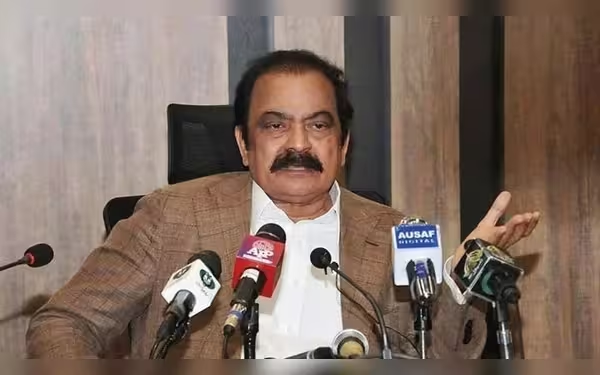Saturday, November 16, 2024 05:49 PM
Rana Sanaullah Anticipates Breakthrough in Constitutional Amendments
- Rana Sanaullah optimistic about constitutional court establishment.
- Political parties drafting amendments for judicial reforms.
- Urgent need for reforms before Chief Justice's retirement.
 Image Credits: geo
Image Credits: geoRana Sanaullah expresses optimism for a breakthrough in constitutional amendments addressing judicial reforms in Pakistan.
In recent developments within Pakistan's political landscape, Rana Sanaullah, the Prime Minister's Adviser on Political and Public Affairs and a prominent leader of the Pakistan Muslim League-Nawaz (PML-N), has indicated a potential breakthrough regarding contentious constitutional amendments. These amendments, which focus on the judiciary, include a proposal to establish a constitutional court. This move comes at a time when various political parties are working towards a 'minimum consensus' to address the ongoing challenges in the judicial system.
Sanaullah's remarks were made during an appearance on the Geo News program 'Aaj Shahzeb Khanzada Kay Sath.' He expressed optimism about the progress of the proposed constitutional package, despite the government's current lack of a two-thirds majority in both houses of parliament, which is necessary to pass such legislation. The PML-N, along with the Pakistan Peoples Party (PPP) and the opposition party Jamiat Ulema-e-Islam-Fazl (JUI-F), are reportedly drafting their versions of the amendments, signaling a collaborative effort to address the judiciary's role in Pakistan's governance.
The urgency of these amendments is underscored by the impending retirement of Chief Justice of Pakistan, Qazi Faez Isa, in October. Speculation has arisen regarding a possible extension of his tenure, particularly following a request from the Pakistan Tehreek-e-Insaf (PTI) for an early notification regarding the appointment of the next Chief Justice. This backdrop adds a layer of complexity to the ongoing discussions about judicial reforms.
During his interview, Sanaullah emphasized that consultations with other political parties have not stalled. He noted that the PPP, led by Bilawal Bhutto-Zardari, and the JUI-F, under Maulana Fazlur Rehman, are actively working on their draft amendments. The expectation is that these drafts will be discussed in upcoming sessions after Prime Minister Shehbaz Sharif returns from addressing the United Nations General Assembly in the United States.
Bilawal Bhutto-Zardari has been vocal about the necessity of forming a constitutional court, asserting that judicial reforms must align with the Charter of Democracy. His commitment to ensuring the establishment of this court reflects a broader consensus among certain political factions regarding the need for judicial reform.
Despite the government's claims of having secured the necessary votes to push the bill through, it has faced significant hurdles. Currently, the ruling coalition is short of 13 votes in the National Assembly and nine in the Senate. Efforts to garner support from the JUI-F have not yielded the desired results, as the party's leadership has expressed concerns that the proposed amendments may serve to protect the coalition government rather than promote genuine reform.
The political dynamics surrounding these constitutional amendments highlight the intricate balance of power among Pakistan's political parties. The ruling coalition, which successfully ousted former Prime Minister Imran Khan in 2022, now finds itself navigating a complex landscape where alliances and opposition can shift rapidly.
As the discussions continue, the outcome of these proposed amendments will have significant implications for Pakistan's judicial system and the broader political environment. The establishment of a constitutional court could potentially reshape the judiciary's role, but achieving consensus among diverse political factions remains a formidable challenge. The coming days will be crucial in determining whether a 'minimum consensus' can be reached, paving the way for much-needed judicial reforms in Pakistan.













